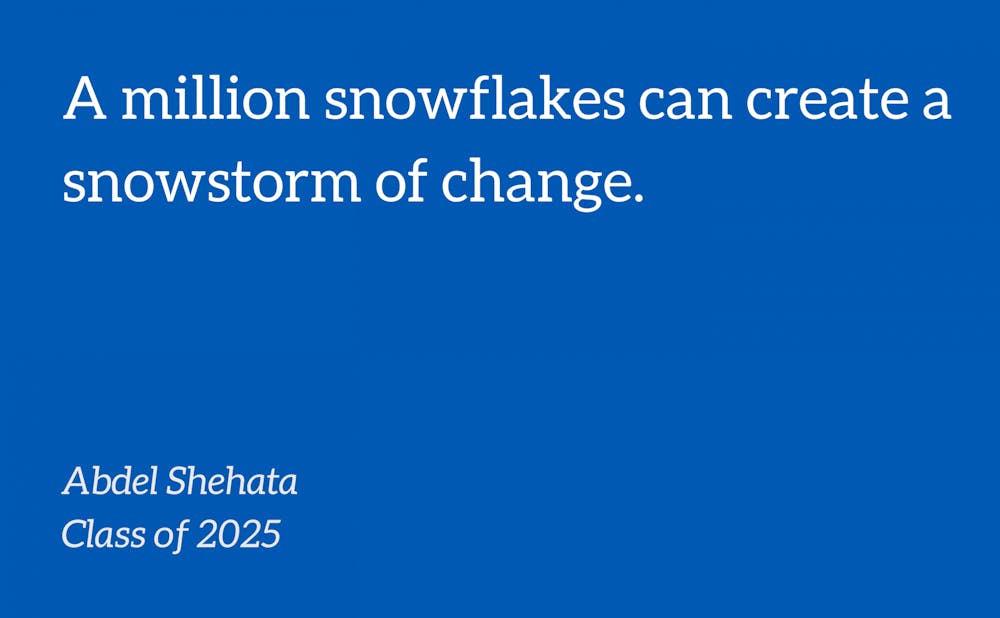Gazing at the sky, I try reaching out to the stars. But my hands can never reach far enough to touch the stars. Once again, I am reminded of my own powerlessness, and humanity. Nonetheless, I got up from the grass and started walking to my dorm. During the walk back, I pondered about the human ingenuity behind Duke’s gothic architecture. My train of thought didn’t last long, evaporated due the fact that I have an 8:30 in a few hours.
Making it back to my room, I quickly climbed up my bed and tried to get some sleep. But I couldn’t sleep because my thoughts were racing at the speed of light. For some reason, my thoughts were converging to one memory: the first time I held my nephew. When I first found out that my brother was having a baby, I was understandably worried if I would be a good uncle. Those worries melted away the moment when I first picked up my nephew. Instead of melting into water, those worries melted into oil, igniting a fire in me to try to be the best uncle I could possibly be.
Eventually I fell asleep, and it wasn’t until the weekend came around that I had time to reflect about my night. The stars for me represented cosmic or universal change: things that one human will never be able to change or reach. No matter how hard I work, I will never be able to reach another star in my lifetime or eradicate world hunger. Accepting this powerlessness closed a box on most of my childhood dreams and ambitions. Nonetheless, it allowed me to accept the fact that I don’t need to be the greatest or the smartest or the funniest human being to be self-satisfied. Instead, I can be myself, whoever that is.
The gothic buildings and Duke for me represented societal triumph or change. Duke, as an institution, might have originally been founded due to the donations of two men: Washington Duke and Julian Carr. Nevertheless, it wasn’t those two men who made Duke what it is today. Instead, it was the students, the staff, the professors, the administrators, and the alumni who made Duke the institution it is today. In other words, this type of change needs the collective force of a group for it to occur. But it also needs leaders and pioneers to carve out a path for the collective. Those leaders and pioneers are what the Duke curriculum tries to cultivate. Unfortunately for Duke, I don’t want to be a leader or a pioneer. Instead, I am satisfied with the honour of being part of the collective: I will vote for what I believe in, and I will change my lifestyle for my beliefs. Modern society tends to overlook the role of the collective for radiant leaders. Nevertheless, there would be no change or leaders without the collective.
The fire ignited by carrying my nephew, on the other hand, I would describe as both personal and communal change. This type of change is motivated by our direct desire and reactions. It’s the most selfish type of change since most people embark on it due to personal reasons. However, this type of change is also the one we have the most control over. Most people can’t run for office or become world class scientists, but a good majority of people can afford to drive over to their local food bank and donate food, or they can also afford to help their parents and grandparents with gardening. This is the type of change that people most tend to disregard due to the rise of mass society. People tend to think that the only effective type of change is government or societal change, which is true when thinking about the future. However, waiting for governmental change doesn’t help the people who are suffering in the present. That's where personal and communal change comes in. This type of change on an individual level might not create a mountain, but a million snowflakes can create a snowstorm of change.
I am an impulsive person who tends to act more with his emotions than his brain. Therefore, it only made sense for me to commit whatever energy I have to personal and communal change. There I can see the fruits of my labor quickly through people’s reactions or material things. I can also follow my own selfish values and passions to help others. Nonetheless, this might not be your path of change. Your path of change might be following the Duke path and becoming a leader. You might also be ambitious and confident enough to pursue universal change. You might also be the type of person to pursue different types of change simultaneously. No matter how you want to change the world, just remember that you have limited energy and time to pursue your change, So no pressure, but make it count.
Abdel Shehata is a Trinity first-year. His column runs on alternate Thursday.
Get The Chronicle straight to your inbox
Signup for our weekly newsletter. Cancel at any time.

